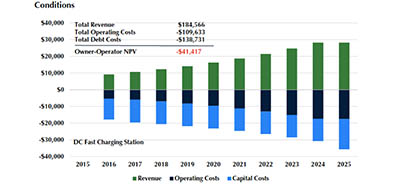Last year, I spoke to a Slate reporter who asked why the Obama Administration had not invested more in electric vehicle (EV) charging infrastructure. Last night, the administration took steps to reduce transportation emissions by making charging easier and more affordable and by leading the way through a unified, national effort.
The administration announced several initiatives to promote EV adoption. Notably, $4.5 billion in funding has been designated to support guaranteed loans for the installation of new EV charging stations. The administration also plans to develop a guide for federal funding, financial, and technical assistance for EVs and EV charging infrastructure, as well as invest in research and partnerships that will expand EVs’ consumer appeal.
More Funding
Range anxiety, or a simple lack of available charging options, continues to impede the growth of the EV market. The administration announced $4.5 billion in guaranteed loans through the U.S. Department of Energy’s (DOE) Loan Program Office to install EV charging stations. Expanding federal loans to include EV charging stations may help remove a major impediment to investing public charging by reducing the cost of capital.
A 2015 C2ES report recommended government loans in the short term to help stimulate the growth of public charging infrastructure and create a sustainable charging network. The report found that charging service providers face difficulties earning a return on investments for public charging projects, but could develop profitable business models with government financial support.
Federal Standards
The administration is proposing to develop federal standards to assist with developing networks of DC fast charging stations, which can charge an EV in 30 minutes or less. The U.S. Departments of Energy and Transportation will produce a guide to federal funding programs, financing incentives, and technical assistance for EVs and charging stations. The intervention of the federal government may help create some more consistency between charging networks with varying standards and processes, and the guide may establish an authoritative and inclusive resource for all stakeholders to turn to for a better understanding of EVs.
The proposal leverages existing programs, such as the congressionally approved 2015 FAST Act designating travel corridors for alternative fueling stations, to help expand DC fast charging networks.

